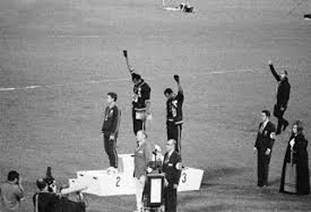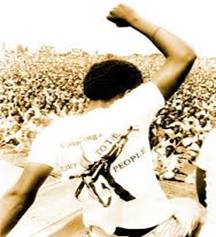Black History Month, Zimbabwe Black Indigenization And Race, The Struggle Continues
By Tsungai Chipato
12 February, 2014
Countercurrents.org


Since the era of Booker T Washington who advocated for the belief in accommodating white people, or his fellow comrade W.E.B Du Bois' preferred choice of black militancy and social justice. African Americans have long been questioning the terms of their relationship with Caucasians within everyday life.
According to Professor of Law at Washington University Barbara Flagg, our society frequently suffers from what is known as the “transparency phenomenon ” wherein, we as a global village have accepted the false premise; that the international standards existing within our current global order are actually neutral and self-evident.
Zimbabwe as a republic is undergoing an evolution that is stirring passionate debates amongst its current incumbent leaders, opposition and the general Zimbabwean populace on how to steer the country forward. The African American way of thinking has over the centuries coalesced around two philosophies within black communities that mirrors the same aspects of what is currently taking place within Africa , Zimbabwe and the Diaspora.
Current schools of black-thought fall mainly into what is known as “ critical race theory ” or its opposite which is “ black neo-conservatism ”. Both birthed amongst black intellectuals within the legal world during the 1960's these schools of thought and their various philosophical offshoot variants have blossomed; on their own volition throughout the preceding years within North America .
Leading figures such as Thomas Sowell or Justice Clarence; are considered the champions of black neo-conservatives within the United States and have helped articulate a black conservative message that is currently fighting for mainstream supremacy within the United States .
African American neo-conservatism is based on the belief that after the 1964 Civil Rights Act and 1965 Voting Rights Act, black equality was officially legally attained. All the issues currently being affected by black people are viewed by black neo-cons; as having little to do with race and more to do with errors in implementing public policy.
For neo-cons; the fight against Caucasian injustice is over and only black assimilation will bring salvation
Critical Race theorists on the other hand; led by intellectuals such as Professor Derrick Bell; believe that racism or discrimination is a permanent phenomenon within society and should constantly be fought against. Current legislation that has been passed against discrimination is not seen as having been adequate enough in redressing minority issues within the United States .
Most of the black leadership within the United States Congress has “ critical race theory ” leanings; President Obama himself is considered a moderate critical race theorist at heart even though his current public office has managed to restrict his inclinations to a minimum.
These two schools of black-thought have somehow managed to organically diffuse into all aspects of how African Americans view themselves subconsciously in their day to day lives. Both thoughts; have been actively trying to find answers to all black social-agenda problems such as: how we as black people define who a sellout or an Uncle Tom is; or what the best times for black people to accommodate or protest with institutional dogma is?
According to Bernie D Jones; “ drug related crime, teenaged parenthood, disrupted and disrupting family life all are manifestations of a despair that feeds on self “the majority of African Americans still live in despair; 50 years after the Civil Rights was passed in America.
North America has a caste system, which is entirely based on free-market economics wholly sustained by archaic political and social institutions; built on legacies of systemic racism and slavery.
Martin Luther King died trying to fight the last vestiges of black subjugation which were mainly based on economic inequality. Black empowerment agendas such as the Zimbabwe Indigenization Act, have now been termed as right leaning, anti-democratic leanings although, to the common layman; it is obvious that these policies try to remedy the inequities that exist within our society.
The days of lynching blacks or calling them, “ nigger or kaffir ” has now been replaced by predatory capitalism and legal disenfranchisement. What makes this situation more deplorable is the current system of globalization, whereby practices of exploitation and discrimination are being fine tuned and perfected within the ghettos of North America before being shipped off to developing nations such as Zimbabwe or South Africa; as nothing more than refined and devastating trade policies.
Within North America it is the norm rather than the exception to strip economic capital from minority communities whilst simultaneously flooding the same disenfranchised inhabitants with below quality; cheap and unhealthy products. Aboriginal and native people have been experiencing this type exploitation for centuries whilst being shunned and castigated for having social vices such as high drug use or prevalent crime rates. Subjugation still exists within the world; the only difference is that; it has morphed into new terms and mannerisms for the 21 st century.
Racism is still; by and large only really associated with violence or hate by the greater public, this has resulted in society; compartmentalizing it into a distinct category only to be retrieved for certain issues or topics within North America . Unfortunately the economic and social mobility side of black empowerment is rarely ever discussed except around Black History Month and Martin Luther King celebrations such as now.
As we enter another Black History month let us not forget; that the struggle continues in Africa as well as North America . Economic inequality for black people globally still exists and the stigma of being a black man or an ethnic minority in a Caucasian man's world is as much alive today as it was in Fredrick Douglass' time.
Africa and North American blacks have been working in tandem ever since the 1960's toward Pan African issues. This symbiosis is based on a philosophy that has been documented ever since the 1800's.
Black America's struggles have always been Africa 's struggles as well, just as much as Black Africa's victories have been America 's victories as well. It is remarkable that journals and publications fail to educate their readers the fact that, around the late 1960's, many Caucasians had been abandoning the civil rights agenda in droves.
This phenomena of “bailing out ” has not changed throughout the years, civil rights is now actually considered to have been fully achieved within North America, and is now usually used as a footnote or example for other public agendas currently ongoing on within American debates.
This Black History Month keep this in mind, according to the rest of the world; black people and other ethnic minorities are free. Although we are economically impoverished from the legacies of slavery and colonialism we should at least be happy at the fact that we can vote and have seen the day that America had a Black President.
“Abstract principles such as crying out for justice, freedom, poverty often lead to legal and social results that end up harming the victims and further perpetuating their inferiority status……living and sharing things with white people does not necessarily mean that you are equal. You could still be a second class citizen living in a first world environment”.
The revolution continues, and as usual it will not be televised!
Tsungai Chipato is a Journalist and blogger within Toronto CanadaContact him @: [email protected]
Comments are moderated
